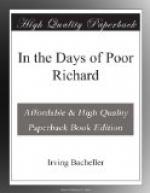Mr. Pinhorn partly covered his mouth and turned to the boy and whispered:
“It is a time of violent men. Let us hold our peace.”
At the next stop where they halted for dinner Mr. Adams asked the boy to sit down with him at the table. When they were seated the great man said:
“I have to be on guard against catching fire these days. Sometimes I feel the need of a companion with a fire bucket. My headlight is hope and I have little patience with these whispering, croaking Tories and with the barons of the south and the upper Hudson. I used to hold the plow on my father’s farm and I am still plowing as your father is.”
Jack turned with a look of inquiry.
“We are breaking new land,” Mr. Adams went on. “We are treading the ordeal path among the red-hot plowshares of politics.”
“It is what I should like to do,” said the boy.
“You will be needed, but we must be without fear, remembering that almost every man who has gained real distinction in politics has met a violent death. There are the shining examples of Brutus, Cassius, Hampden and Sidney, but it is worth while.”
“I believe you taught school at Worcester,” said Jack.
“And I learned at least one thing doing it—that school-teaching is not for me. It would have turned me into a shrub. Too much piddling! It is hard enough to teach men that they have rights which even a king must respect.”
“Let me remind you, sir,” said Mr. Pinhorn, who sat at the same table, “that the King can do no wrong.”
“But his ministers can do as they please,” Mr. Adams rejoined, whereat the whole company broke into laughter.
Mr. Pinhorn covered his mouth with astonishment, but presently allowed himself to say: “Sir, I hold to my convictions.”
“You are wrong, sir. It is your convictions that hold to you. They are like the dead limbs on a tree,” Mr. Adams answered. “The motto of Great Britain would seem to be, ‘Do no right and suffer no wrong.’ They search our ships; they impress our seamen; they impose taxes through a Parliament in which we are not represented, and if we threaten resistance they would have us tried for treason. Nero used to say that he wished that the inhabitants of Rome had only one neck, so that he could dispose of them with a single blow. It was a rather merciful wish, after all. A neck had better be chopped off than held under the yoke of tyranny.”
“Sir, England shielded, protected, us from French and Indians,” Mr. Pinhorn declared with high indignation.
“It protected its commerce. We were protecting British interests and ourselves. Connecticut had five thousand under arms; Massachusetts, seven thousand; New York, New Jersey and New Hampshire, many more. Massachusetts taxed herself thirteen shillings and four pence to the pound of income. New Jersey expended a pound a head to help pay for the war. On that score England is our debtor.”




